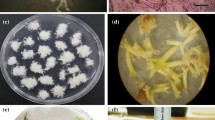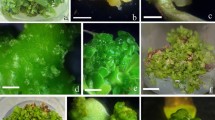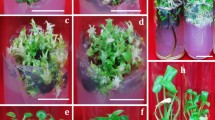Abstract
STEWARD et al.1 reported the development in culture of carrot embryos which appeared normal and were able to continue development through all stages of the normal carrot life cycle. Waris2, on the other hand, has reported that embryos from the seeds of Oenanthe aquatica L., in the presence of 0.1 per cent glycine, enter an abnormal developmental cycle in which nodules form on the embryo, then break off to form further embryos; most of the embryos were of abnormal structure. We have observed carrot embryoids of abnormal structure which were developed in tissue culture; they budded off other embryoids instead of continuing their development towards plantlets.
This is a preview of subscription content, access via your institution
Access options
Subscribe to this journal
Receive 51 print issues and online access
$199.00 per year
only $3.90 per issue
Buy this article
- Purchase on Springer Link
- Instant access to full article PDF
Prices may be subject to local taxes which are calculated during checkout
Similar content being viewed by others
References
Steward, F. C., Mapes, M. O., and Mears, K., Amer. J. Bot., 45, 705 (1958).
Waris, H., Physiol. Plant., 12, 753 (1959).
Author information
Authors and Affiliations
Rights and permissions
About this article
Cite this article
HILL, G. Multiple Budding on Carrot Embryos arising in Tissue Culture. Nature 215, 1098–1099 (1967). https://doi.org/10.1038/2151098a0
Received:
Issue Date:
DOI: https://doi.org/10.1038/2151098a0
This article is cited by
Comments
By submitting a comment you agree to abide by our Terms and Community Guidelines. If you find something abusive or that does not comply with our terms or guidelines please flag it as inappropriate.



